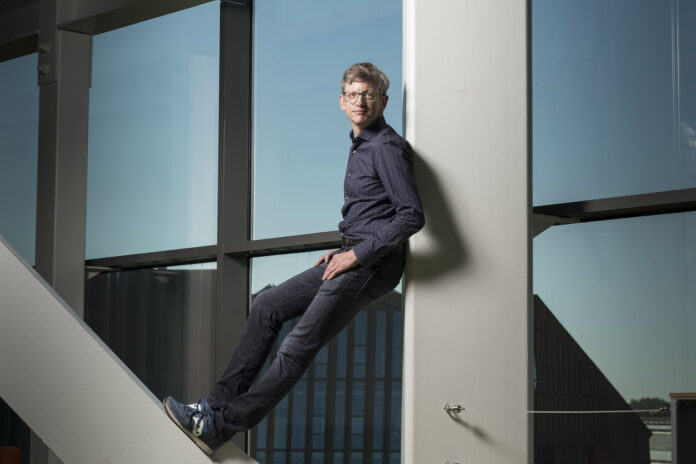As a biologist, columnist Dirk-Jan Scheffers can tell you everything about, for instance, the need for vaccinations. But scientists don’t always have the necessary narrative skills to get their message across.
Nineteen years ago, a good friend introduced me to the many worlds of David Mitchell by gifting me a copy of his book Cloud Atlas. I have been a fan of his ever since. The man is an amazing storyteller.
I won’t bore you with the details of what his books are about. My clumsy descriptions would deter even myself from reading his books if I weren’t already a fan.
Last Friday, Mitchell presented the annual Van Der Leeuw lecture in the Martini church, on storytelling. What makes a story, how do we tell them, and is each one of us a story on its own? He told us a plausible personal history that turned out to be completely fabricated and told us a well-known fairytale in a completely new way. Afterwards, he explained to us what he’d done: how, as a writer, he constructs his world.
Mitchell introduced the term ‘iwath’ (I was there), which is a short description so specific that the reader or listener feel it’s true, which lends credibility to the story as a whole. While I normally tend to doze off during lectures or keep checking my watch, Mitchell completely made me lose track of time, the concept of which is an important theme in his work.
We should be showing people how hard we worked
After Mitchell’s lecture, Ionica Smeets, professor of science communication and a columnist, reflected on the concept of scientists and their storytelling. According to her, there is much room for improvement. Not only should scientists do better in sharing their discoveries with laypeople, but their communication with their peers also needs work.
We need more ‘iwaths’, to allow people to get to know the scientist behind the discovery or invention. We should be showing people why certain topics interest us, and how hard we worked to reach the conclusions we did.
Smeets is right. The last big article my group published was about how we searched for results for years, jumping from one hypothesis to another. We presented it as a logical journey where, step by step, we went from a single hypothesis to the inexorable final conclusion.
A story doesn’t need facts, but facts can’t do without a story
While it wasn’t a bad idea to stick to the pattern of a scientific article, but it was ultimately a bit dull, especially compared to ‘three months later, the brave PhD student was left empty-handed once again because Scheffers had sent her down the wrong path’.
Smeets ended her remarks by saying that ‘a story doesn’t necessarily need facts, but facts can’t do without a story’. As a biologist, I can tell you all the need for vaccinations, or the effects of climate change on our environment. But it feels as though it’s becoming harder to reach my audience, and even when I do, my findings are immediately called into question.
That’s why we need cultural and behavioural scientists, as well as artists; they can help me tell a better story and study how we can reach people. Unfortunately, our government, which largely values telling stories without facts, are working hard to cut the budgets for these fields.
At least we’ll always be able to escape into one of David Mitchell’s worlds.
DIRK-JAN SCHEFFERS




